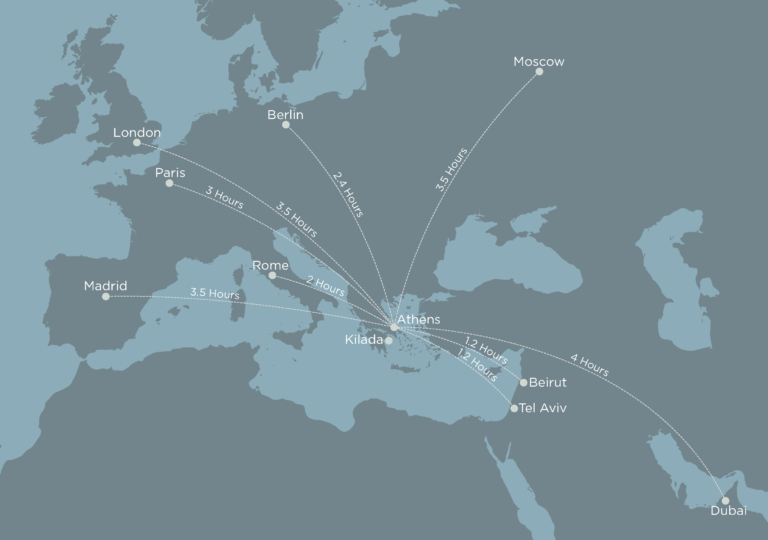Basic Greek Phrases and Phonetics for English Speakers
A list of basic Greek phrases for tourists or property hunters including the phonetic pronunciation for English speakers.
I’m trying to use standard phonetic rules here. A capitalised syllable indicates that that part of the word is hardened or emphasised. Doing business in Kilada, looking around a new property. Talking to a land or estate agent, you will likely need to know a few basics.
In practice many in Greek real estate at the professional level understand English and speak and write it as a competent second language. However, there is no harm in learning a little Greek. In most situations your effort will be appreciated, and that’s always a win.
Practice makes perfect though. Try these out with people you know first. Be open to corrections and additions, and you’ll be conversing well enough in no time
Greetings
Let’s start with a basic greeting “Hello”: Γειά σου pronounced “YAH-soo”
If it’s a friendly greeting try “Γεια” pronounced “YAH-sas”.
More common greetings to add some variation might be
Χάρηκα πολύ pronounced “HA-ree-ka po-LEE” which is good day
How are things with you is “Tι κανείς” pronounced “tee-KAH-nis”. Remember to put the inflection as this is a question.
Good morning is Καλημέρα pronounced “kah-lee-MER-ah”
Good afternoon evening: Καλησπέρα pronounced “kah-lee-SPER-ah” this also works for the evening
A way in which linguistic similarities show itself is the phrase Καληνύχτα pronounced “kah-lee-NEEKH-tah”. This is used on departing. Which when you think about it makes it an anomaly linguistically. You are greeting someone at night. You are saying goodbye to someone at the end of the day
Social Situations
Please is Παρακαλώ pronounced “para-kah-LOE”
This is a multi use word which is used both to make a polite enquiry and to respiond to a poplite enquiry. Adding Παρακαλώ as a suffix
Introducing yourself. Perhaps the first thing many learn when taking on a new language is Με λένε pronounced “may LEH-neh”. Meaning My name is.
Conversely What is your name? is; πως σε λένε? And pronounced “pos-oh LEH-neh”. Remember the question inflection at the end.
If you are leaving use Γειά σου pronounced “YAH-soo” meaning goodbye. In practice the “oo” makes the last syllable sound more like “sue”
A common truncation is to say “YAH”. Which is the equivalent of “See you around” or perhaps “Later” when used in the vernacular. This is less formal and used among friends.
Slightly more formally you may say Τα λέμε pronounced “tah-LEH-meh” which is “Talk later”
Other terms used to depart include a simple Yes Ναί pronounced “neh”. Unusually a short word starting with a hand “n” sound that means yes. Be careful of that one.
The corollary being : όχι pronounced “OH hee” which means no.
Finally, should you get stuck, need help or bump into someone the polite thing to say would be Συγνώμη meaning sorry and pronounced “See-GuNO-mee”
Part two coming soon
Historic Greece
Travelling around Greece and visiting different places is easy thanks to the excellent ferry and road network. Yes, it is tempting to stay in Kilada to enjoy your villa in Kilada, but why not make the most of this beautiful country.
The Argolis Region
The Great Theatre of the Asklepieion at Epidaurus (35 miles)
Set in stunning natural surroundings this theatre, built in the classic Hellenistic style more than 2,000 years ago, and largely unchanged since, offers a timeless and still functional view of Greeks historic past.
Archaeological Museum of Nafplio (45 miles)
Built in 1713, this archetypical structure holds Greek historical artifacts pre-dating civilization. The Paleolithic cluster of alters dating back past 20,000 BC The museum contains tools, jewellery and pot-made vessels giving an incite into Greek pre-History.
The Palamidi Castle (60 miles)
More modern history presents the Palamidi Castle. Built by the Venetians in 1714 to protect their commerce in the area, the castle set almost 400 feet up, high and canted on the hillside. It presents an awe inspiring monument to Greece’s important role in Mediterranean trade.
Friendly Greece
One of the best ways to describe Greece is as people-friendly. The local Greek population genuinely love visitors and many ex-pats become part of the local community. The social culture in Greece is much more open when compared to living as an ex-pat in many other European countries. Local events form part of the rich local culture and tapestry of life in Greece.
MEMBERSHIP PROGRAMME


